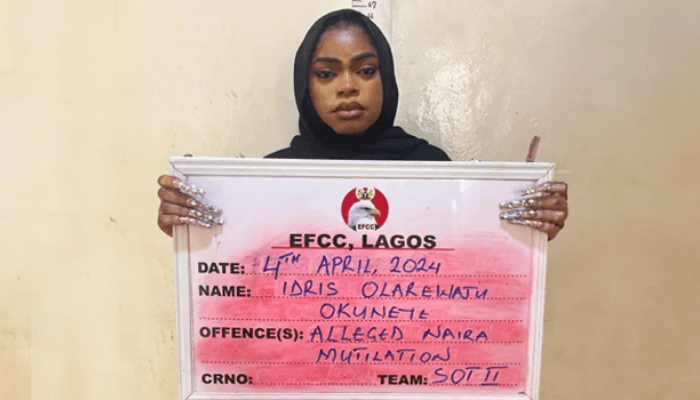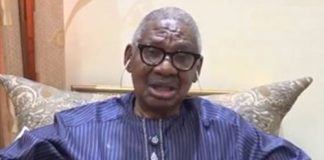🌿 Ruzu Non-Alcoholic Herbal Bitters
Ruzu Non-Alcoholic Herbal Bitters is a natural health supplement specially formulated to:
- ✅ Promote general wellness
- ✅ Detoxify the body
- ✅ Support the treatment of various ailments
Made from a powerful blend of 100% organic and medicinal herbs, Ruzu is completely alcohol-free, making it ideal for:
- 👪 All age groups
- 🌱 Health-conscious individuals
- 🌿 Anyone seeking non-alcoholic herbal remedies
Whether you're looking to boost your vitality, cleanse your system, or support healing the natural way, Ruzu Bitters offers a trusted herbal solution.
By Moshood Olajide
Since Okuneye Idris, also known as Bobrisky, has been convicted and sentenced to six months imprisonment by the Federal High Court in Lagos following a prosecution spearheaded by the Economic and Financial Crimes Commission on the charges of naira mutilation, several diversionary opinions have flooded the Internet space.
The cross-dresser was convicted after pleading guilty to the charges of naira mutilation; this is in line with the principle of law. In Dangote v. Civil Service Commission Plateau State & Ors. (2001), the court held that after a plea of guilty by an accused person before the Court, the Court must formally proceed to conviction without calling upon the prosecution to prove the commission of the offence. This is because the admission of guilt on the part of the accused has fully satisfied the burden of proof.
Some schools of thought, however, are of the view that the sentencing of six months is excessive, while others are of the view that the accused ought to be fined only. Some, on the other hand, opine that since the accused opted for plea bargaining, he ought to have been exonerated as a first-time offender. All these are mere parlour assertions that have no grounds in law.
As a starting point, Section 21(1) of the CBN Act 2007 is an elaborate provision that makes mutilation of the naira punishable. For clarity, it is important to reproduce the section here in verbatim:
A person who tampers with a coin or note issued by the bank is guilty of an offence and shall, on conviction, be liable to imprisonment for a term not less than 6 months, to a fine not less than $50,000, or to both such a fine and imprisonment.
The question now is: in view of the above provision and considering the plea bargain between the prosecutor and the accused legal practitioner, together with the option of a fine in the CBN Act, was the sentencing excessive in line with what has been blabbed around? The answer to this question lies in the examination of relevant statutory provisions.
In a close interrogation of Sections 270–275 of the Administration of Criminal Justice Act 2015 and Article 15 of the National Policy on Prosecution 2016, which regulate the application of plea bargains in Nigeria, both provisions did not anticipate exoneration of crime or lesser sentencing if there was any agreement between the prosecutor and the defendant in respect of plea bargains. This nullifies the opinion that plea bargains ought to have reduced the sentencing. The application of plea bargaining must not defeat the attainment of substantial justice. Justice must flow on a three-way street in criminal matters. It must lead to justice for the defendant (Bobrisky), the victim (the naira currency), and society (the public at large). The court of appeals per Olujimi JCA puts the position of plea bargain succinctly in Gava Corporation Limited v. FRN (2014) as follows:
An accused person who alleges that he had a plea bargain with the prosecutor cannot emerge unscarred or without blemish or stigmatisation of conviction.
A trial judge also has discretion in sentencing. A court does not make pronouncements or sentences for accused persons based on what is popular or what the public will think. In Ezerike v. State (2022), the Supreme Court pontificated that a trial judge has discretion in matters of sentencing and can impose a maximum sentence where applicable, and such discretion must be exercised judiciously. As a follow-up, Section 311(2) of the Administration of Criminal Justice Act, 2015, sets out four factors that the Court should invariably consider in performing its sentencing function. The section reads as follows:
The Court shall, in pronouncing sentences, consider the following factors in addition to sections 239 and 240 of this Act:
(a) the objectives of sentencing, including the principles of reformation and deterrence;
(b) the interests of the victim, the convict, and the community;
(c) appropriateness of a non-custodial sentence or treatment in lieu of imprisonment;
(d) previous conviction of the convict.
It is therefore clear that the trial court considered two sets of facts in giving the cross-dresser a severe maximum sentence. It considered the facts that made it feel duty-bound to impose a sentence that could serve as a correction to the convict and deterrence to other persons since issues of naira mutilation have been a serious offence gaining notoriety in society with little or no charges or arrests made to warrant conviction previously. It then considered the public interest in protecting the naira and curtailing further abuse.
In view of the above provisions and analysis, the learned trial judge appears to have been influenced strictly by balancing the principle of deterrence and public interest together without having regard to paragraph d of Section 311(2) of the ACJA, considering the accused is a first-time offender.
However, if the accused is aggrieved, it is left for him, through his counsel, to appeal the conviction. In Adeyeye v. State (1968), Ademola, CJN (of blessed memory), held that it is only when a sentence appears to err in principle that an appellate court will alter it. If a sentence is excessive or inadequate to such an extent as to satisfy this Court that when it was passed there was failure to apply the right principles, then this Court will intervene.
It follows that the proper forum to address sentencing is at the court of appeal, not ventilating opprobrium remarks on social media and putting the judiciary to unconstructive views. It is also reemphasized here that a plea bargain does not translate to the exoneration of an offence; if that has always been the case, society will not be safe, and everyone will be tempted to commit crime. In fact, plea bargaining may not influence the imposition of minimum sentencing or the imposition of just a $50,000 fine as punishment for mutilating the naira as stipulated in Section 21(1) of the CBN Act 2007 as some people expected; the type of sentencing to impose is strictly at the discretion of the judge based on the submissions of the prosecutor and that of counsel to the defendant, the peculiar facts of the case, public policy, and public interest in conjunction with sound principles of law.
Moshood Olajide writes from the Faculty of Law, Obafemi Awolowo University, Ile–Ife, Osun State.


















